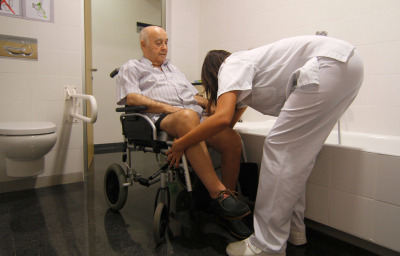
A blood test can help predict which preterm babies will go onto develop chronic lung disease, allowing for earlier diagnosis and more targeted treatments, according to a new study.
The research, led by Murdoch Children’s Research Institute (MCRI) and published in the American Journal of Respiratory Cell and Molecular Biology found that changes in certain blood proteins, alongside gestational age, birth weight and sex, strongly predicated bronchopulmonary dysplasia (BPD) within 72 hours of life.
BPD usually occurs when a baby’s lungs are damaged by respiratory support and the long-term use of oxygen. The disease affects 65 per cent of preterm infants and results in lifelong chronic lung disease and neurodevelopmental disabilities.
The study, which examined 493 blood proteins, involved 23 babies born before 29 weeks’ gestation at the Royal Women’s Hospital. Changes found in 49 of these proteins were detected in babies who later developed BPD. Some differences were noticeable within four hours of a baby being born.
MCRI’s Dr Prue Pereira-Fantini said the study provided a comprehensive map of what occurred in babies with BPD and gave valuable insight about key biological changes in the first few days of life.
“Our ability to predict, prevent and treat BPD is limited,” she said. The tool currently used for early prediction of BPD severity currently fails to look at the disease pathology.
“A BPD diagnosis is usually made at 36 weeks post-menstrual age, which limits potential treatments that can minimise lung injury and improve respiratory outcomes. Our team was able to identify certain proteins in the blood, which when combined with other key birth measures, may predict BPD as early as four hours post-birth.”
MCRI Professor David Tingay said the ability to more accurately predict BPD within the first days of life may allow for earlier diagnosis, more targeted treatments and better-informed counselling for families.
“Changes in BPD rates can be achieved if appropriate lung protective interventions are provided at the right time,” he said. We can better tailor the care of these babies when we know how likely they are to experience lung damage and other complications.”
The team are now looking to create a lung injury assessment tool that could be used to assess all preterm babies admitted to a Neonatal Intensive Care Unit (NICU) or special care nursery for risk of BPD.
“The tool, including a blood test, would provide clinicians with the ability to guide respiratory decisions from birth, giving these babies more chances towards a healthy life,” Dr Pereira-Fantini said.
“Early intervention is likely to be more effective at preventing or minimising the severity of BPD and its long-term health and medical effects.”
Simantha Nation’s son Atticus was born at 26 weeks gestation, weighing just 807 grams. Born very preterm, Atticus struggled to breathe from his first gasp for air.
Atticus was rushed to the NICU, where he was intubated and connected to a ventilator.
Researchers from the University of Melbourne, the Royal Women’s Hospital and The Florey Institute of Neuroscience and Mental Health also contributed to the findings.
Prue Pereira-Fantini, Sean Bryars, Omar Kamlin, Brett Manley, Peter Davies and David Tingay. ‘Plasma proteome profiles associated with early development of lung injury in extremely preterm infants,’ AJRCMB. DOI: 10.1165/rcmb.2024-0034OC








